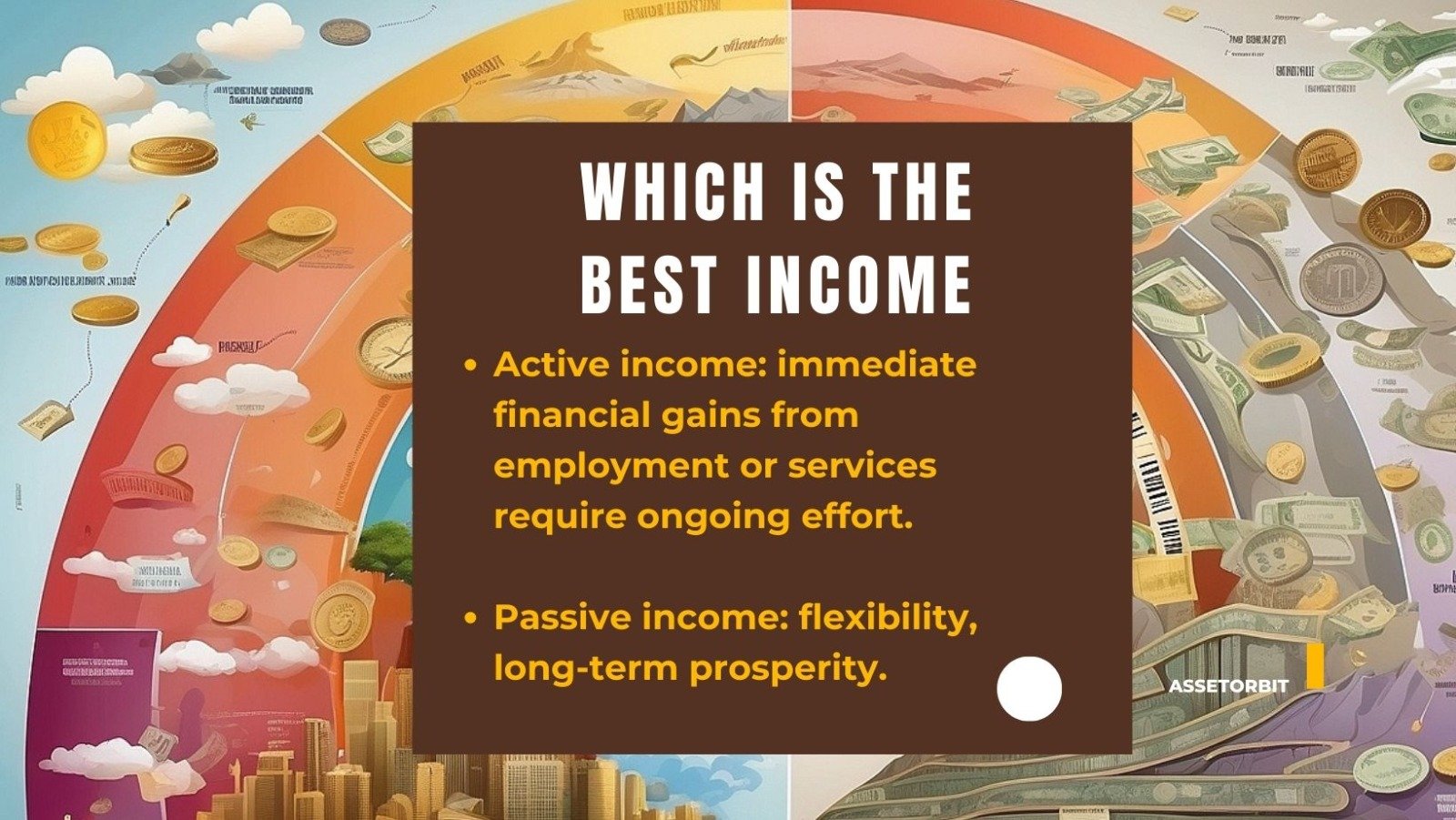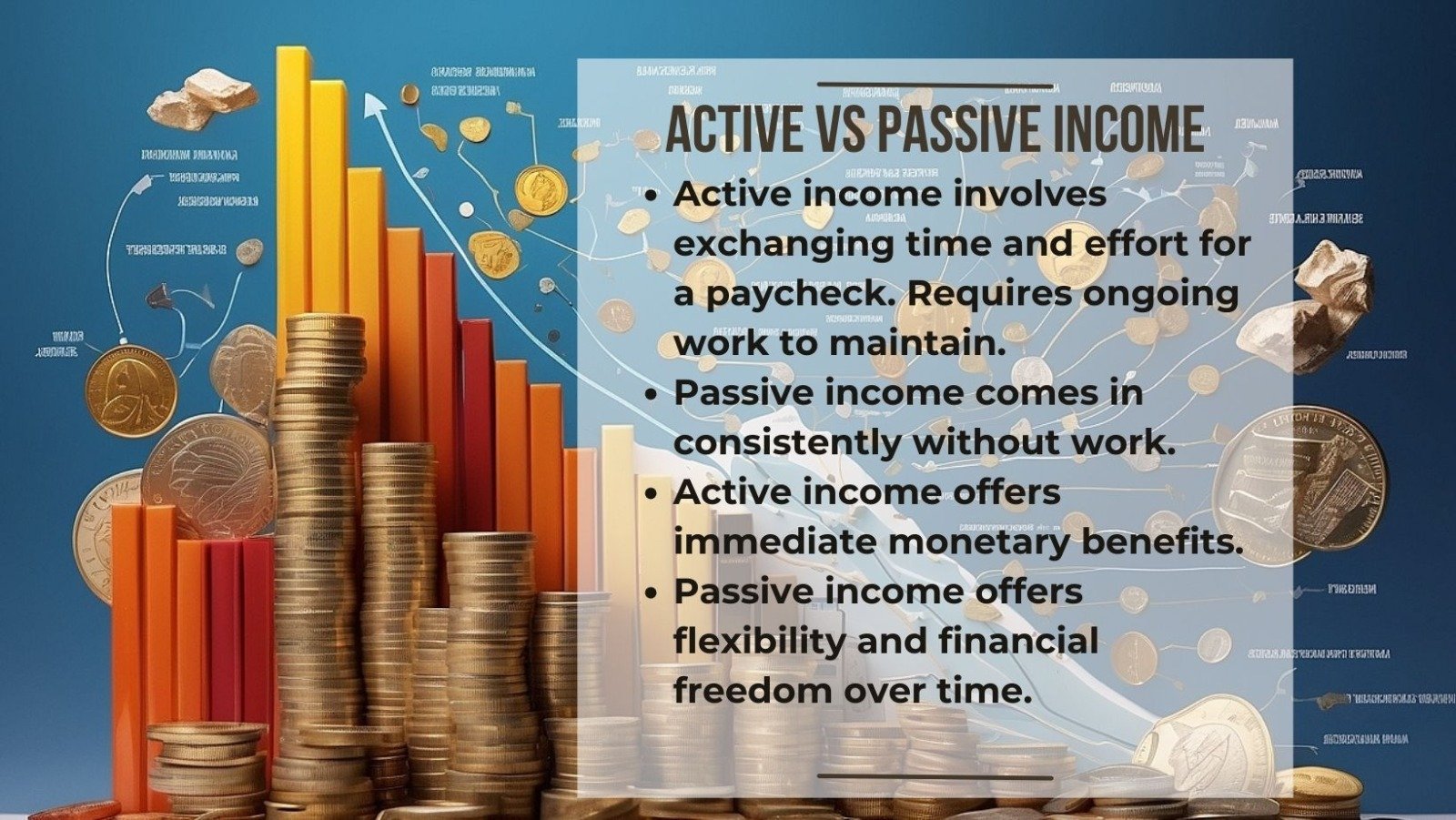Active income involves ongoing actions like work or service, while passive income generates revenue with less effort. Active income offers stability, immediate returns, and career advancement, while passive income offers financial freedom and flexibility.
In Short
Active Income Vs. Passive Income
Active income is money you earn by exchanging your time and effort for a paycheck, like a job or a service you provide. It requires ongoing work to maintain.
On the other hand, passive income is money that comes in on a consistent basis with no work on your part, such as rental income or benefits from investments. It enables you to generate income even while you are not actively working.
While active income provides immediate monetary benefits, passive income has the potential to provide greater flexibility and financial freedom over time.
What Is Active Income?
Active income is defined as money earned through direct and ongoing actions, such as working a job or delivering a service. It is the outcome of exchanging your time and talents for a salary or remuneration.
This type of income requires continuous input and effort, as it stops when you stop working.
What is Active and Passive Income Example?
Examples of Active Income:
- Salary: Regular earnings from a job involve receiving a fixed amount of money on a monthly or biweekly basis.
- Hourly Wages: Hourly pay is a common practice in jobs like hourly employment or freelancing, where the payment is based on the number of hours worked.
- Commission-based Income: Usually in sales or customer service roles, your earnings come from the sales or services you provide.
- Freelance Work: Earnings from providing services or completing certain tasks as part of a freelancing or contract arrangement come under this category.
- Consulting Fees: Earn money by providing expertise or advice in a particular field on a project or hourly basis.
- Business Owner’s Profits: Profits are earned by actively managing and operating a business.
- Professional Services: Professionals such as doctors, lawyers, and accountants earn their income by charging fees for their services.
- Part-time Job Earnings: Income earned from part-time employment.
Examples of Passive Income:
- Dividend Income: Shareholder earnings are the profits earned from owning shares in companies that distribute a portion of their profits to shareholders.
- Rental Income: The money earned from leasing out real estate, such as residential or commercial properties, is significant.
- Royalties: Payments are received for the use of intellectual property, such as books, music, or patents.
- Interest Income: Interest can be earned on savings accounts, certificates of deposit (CDs), or bonds.
- Affiliate Marketing: The income is generated through the promotion and sale of goods and services offered by other individuals over the internet.
- Automated Online Businesses: Online businesses or websites that run on autopilot generate income with minimal ongoing management.
- Real Estate Crowdfunding: Crowdfunding allows individuals to invest in real estate projects and potentially earn a portion of the profits.
- Stock Market Investments: Capital gains and dividends earned from investing in stocks.
- Create and Sell Digital Products: Creating and selling digital products such as e-books, online courses, or software to generate cash.
- Business Investments: Investing in a business as a silent partner or shareholder allows you to earn a share of the profits without active involvement.
Difference Between Active and Passive Income
Passive income, in contrast to active income, consistently generates revenue with less direct effort. It comes in on a regular basis, usually from investments, real estate, or economic activities that do not require continual supervision. Passive income provides for financial growth without the requirement for ongoing active participation, making it a more flexible and possibly sustainable source of income.
Active Income Vs. Passive Income
| Aspect | Active Income | Passive Income |
|---|---|---|
| Definition | Money earned through direct efforts, such as a job or service provision, is valuable. | Income earned with minimal ongoing effort is often derived from investments or business activities. |
| Involvement | It requires continuous time and effort, typically tied to active work. | It requires less direct involvement, providing greater flexibility and time independence. |
| Source | Employment, freelancing, or actively managed businesses. | Investments, real estate, royalties, crypto, or businesses with less day-to-day involvement. |
| Stability | Income stops when work stops; stability depends on consistent effort. | It is more stable and consistent because it keeps flowing even when it's not actively working. |
| Time Commitment | It typically necessitates a full-time or part-time dedication. | While it often necessitates an initial effort, it can yield income with a lower continuous time commitment. |
| Flexibility | There is limited flexibility because it relies on active participation. | It provides more adaptability because it doesn't necessitate continuous focus. |
| Examples | Salary, wages, freelance income. | Rental income, dividends, interest, royalties. |
Which is best passive or active income?

Active income generates immediate financial gains from employment or services, providing stability but requiring ongoing effort. On the other hand, passive income gives greater flexibility and the possibility for long-term prosperity because it continues to flow with less direct engagement. A balanced approach that incorporates both types of income may provide financial security as well as future growth opportunities.
Is Active Income Better?
Advantages of Active Income
• Stability: Provides a predictable source of earnings with regular paychecks.
• Immediate Returns: directly tied to work, allowing quick realization of earnings.
• Skill Development: This involves skill and expertise development, contributing to personal and professional growth.
• Job Benefits: Full-time employment often includes health insurance, retirement plans, and paid time off.
• Career Advancement: Offers opportunities for career progression and advancement.
Disadvantages of Active Income
• Time-dependent: Requires ongoing effort, limiting flexibility.
• Limited Scalability: Earnings are often based on work hours or job salary.
• Vulnerability to Job Loss: Increased vulnerability to economic downturns or job instability.
• Burnout Risk: Constant demand for active involvement can lead to fatigue.
• Income Disruption: Inability to work due to illness or other reasons can stop or decrease active income.
Is Passive Income Better?
Advantages of Passive Income
• Financial Freedom: This provides financial independence by covering living expenses without active work.
• Flexibility: It provides flexibility while requiring less time and attention.
• Scalability: Scalability allows for exponential growth without requiring direct effort increases.
• Diversification: Diversified investments provide a resilient financial portfolio.
• Wealth Building: It contributes to the accumulation of wealth and the generation of retirement income.
Disadvantages of Passive Income
• Initial Effort and Investment: Requires substantial upfront effort.
• Risk: Common investments in stocks, real estate, or businesses pose inherent risks.
• Market Dependence: Market conditions, economic factors, or changes in interest rates influence this.
• Lack of Control: Certain passive income sources may lack direct control, exposing individuals to external factors.
• Delayed Returns: Significant returns may take time and not be immediate.
• Balanced Approach: Combine active and passive income for a well-rounded financial strategy.
Which skill generates passive income best? High-income skills let you make money passively. You can do this by selling digital products, promoting them through affiliate programs, investing in stocks or real estate, or publishing your own work. Read more…
Final Thoughts
The choice between active and passive income depends on individual goals, preferences, and financial strategies. Active income offers immediate stability and a steady paycheck, while passive income offers financial freedom and flexibility. The best approach is a balanced combination of both, allowing for present stability and the potential for long-term wealth and independence. Understanding financial objectives and adopting a diversified income strategy can lead to a secure and rewarding financial future.
FAQ
Is salary active or passive income?
A salary is considered active income because it is earned through direct and ongoing efforts in a job or profession. When you are paid, it’s because of the time and expertise you put into your job. Unlike passive income, which is earned without continual active participation, a wage is earned through consistent effort and presence at work.












Leave a Reply